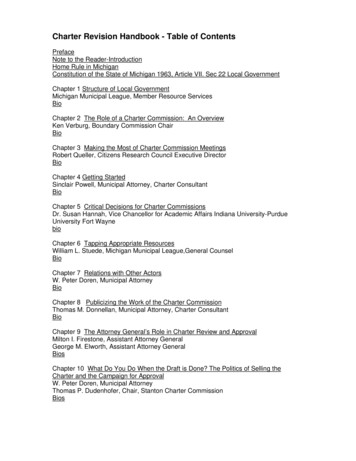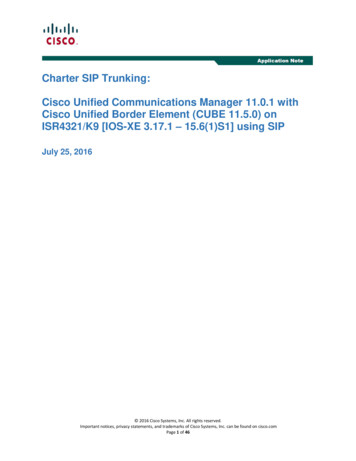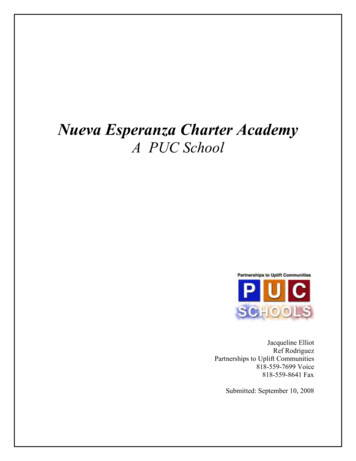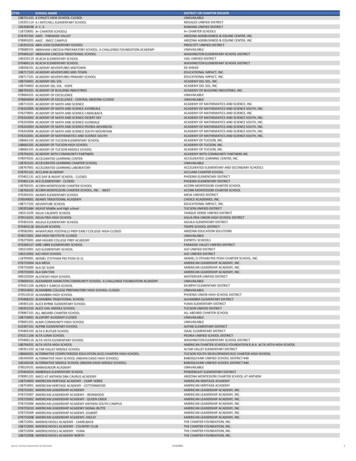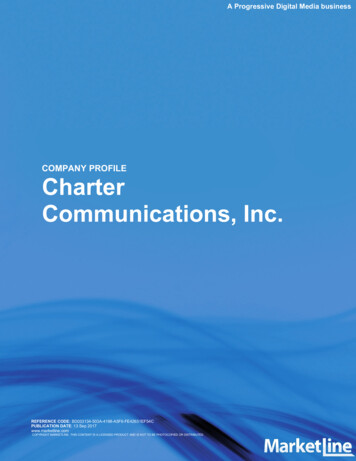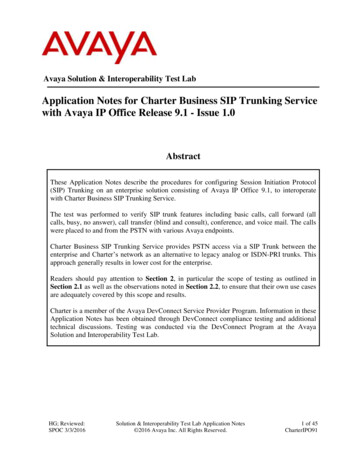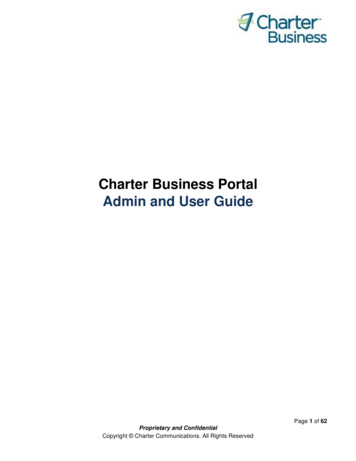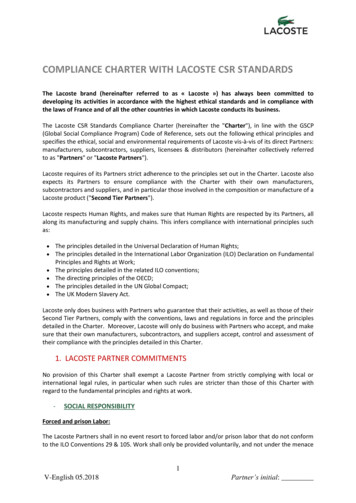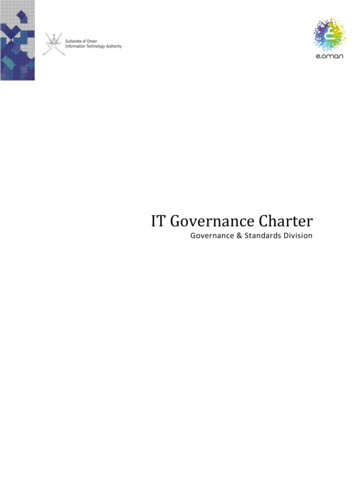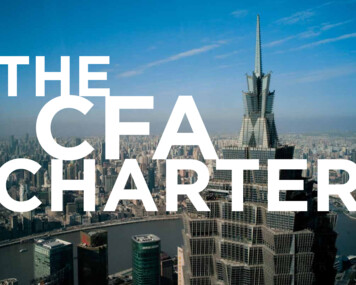
Transcription
CHARTER
The CFA Charter is a globallyrecognized, graduate-levelinvestment credential.Earning it demonstrates acommitment to professionalethics and expertise with thebroad range of skills neededfor competitive careers in theinvestment profession.To earn the CFA Charter youmust complete the CFA Program.
TABLE OF CONTENTSWhat is the CFA charter?4Who earns the CFA charter?6What will I learn?14What is the CFA Program like?22What is it like to be a CFA charterholder?30How do I get started?34I wanted a credentialthat represented a realglobal standard that’sinternationallyrecognized.Nina de Martinis-Majstorovic, CFAParis, FRANCEwww.cfainstitute.org3
what is the cfa charter?Since it was first introduced in 1963, the CharteredFinancial Analyst designation, or CFA charter, hasbecome the most respected and recognized investment credential in the world.Earning the CFA charter demonstrates mastery ofthe skills most needed for investment analysis anddecision making in today’s fast-evolving globalfinancial industry. That’s why employers and clientsaround the world are increasingly seeking outCFA charterholders—often making the charter aprerequisite for employment.To earn the CFA charter you must have four yearsof qualifying investment work experience; you mustbecome a member of CFA Institute (the globalassociation of investment professionals that administers the CFA charter), pledging to adhere to the CFAInstitute Code of Ethics and Standards of ProfessionalConduct on an annual basis; you must apply formembership to a local CFA member society; and youmust complete the CFA Program.Ashley has worked inboth New York andHong Kong andmentors studentswho are interestedin the CFA Program.4The CFA Program is a globally recognized, graduatelevel curriculum that provides you with a strongfoundation of the real-world investment analysisand portfolio management skills and practicalknowledge you need in today’s investment industry.It also emphasizes the highest ethical and professional standards.www.cfainstitute.orgThe Program is organized into three levels, eachculminating in a six-hour exam. CFA Programcandidates report dedicating in excess of 300 hoursof study per level. Completing the entire Program isa significant challenge that takes most candidatesbetween two and five years.To ensure that the Program maintains a focus on theglobal investment management profession from thestandpoint of practitioners, practicing CFA charterholders from around the world are involved at everystage of curriculum development, exam development, exam grading, and even the setting of theminimum passing scores.How well knownis the CFA charter? There are currently more than 90,000 CFAcharterholders working in over 135 countriesaround the world. Regulatory bodies in 19 countries recognizethe CFA charter as a proxy for meeting certainlicensing requirements. More than 125 distinguished colleges anduniversities around the world haveincorporated a majority of the CFA Programcurriculum into their own courses, including theUniversity of Oxford’s Saïd Business School;New York University; INSEAD; Peking University; and Nanyang Technological University.The CFA charter is the future.And if I am committed to bepart of this industry, thenit’s something I should have.Ashley Khoo, CFAHong Kong SAR
who earns the cfa charter?Mexico City, MEXICO
who earns the cfa charter?Our industry has somany different typesof products, and theCFA Program coversevery single differentarea.Ken Luce, CFAToronto, CANADAinvestmentprofessionalsThe CFA Program curriculum is designed tocomplement your experience with a broad rangeof skills determined to be most relevant byinvestment practitioners and employers. Acquiringthis additional knowledge will enhance your professional abilities and will increase your standingwith colleagues, clients, and your employer.career changersMany non-investment professionals, such asattorneys and accountants, choose to earn theCFA charter to gain broader professional expertise. If you are developing an additional area ofproficiency or if you are seeking to make a careerchange into the investment profession, completing the CFA Program is a cost-effective way togain the skills you need for success in today’sglobal investment profession and to signal theseriousness of your intentions.studentsIf you are a student planning to enter the financeor investment profession, there is no better wayto signal your commitment and your ability toperform at a high level than by enrolling in theCFA Program, learning the skills you will need tosucceed in the investment industry, and earningthe CFA charter.Earning the CFA charterhelped Ken find a jobeven during a toughjob market.Ken Luce, CFAToronto, CANADAwww.cfainstitute.org9
CFA Institute and the charter give you an edgein getting the job and then excelling in your job.Rana Atallah, CFAKuwait City, KUWAITHow does the CFAProgram comparewith an MBA program?The CFA Program focuses specifically on investment knowledge; most MBA programs cover abroad range of topics. The self-study nature ofthe CFA Program also enables many candidatesto continue working full time while enrolled inthe Program. Many professionals find that theCFA charter and an MBA complement each other.What jobs does theCFa Charter prepareme for?With growing demandfor the charter, Ranaknows that the hardsacrifices she madeto earn the charterwere all worthit in the end.10The CFA Program equips you with the practicaland fundamental knowledge you need for a widevariety of career choices in the investment profession. CFA charterholders find that earning the CFAcharter provides them with a passport for workingwithin numerous investment specialties and markets across the globe. It also better equips them tochange specialties as their careers evolve.www.cfainstitute.orgAmong these many specialties in the investmentprofession, CFA charterholders hold the following types of positions in more than 130 countriesaround the world:22%Portfolio Managers14%Research Analysts7%5%5%4%4%4%4%30%Chief ExecutivesConsultantsRisk ManagersCorporate Financial AnalystsFinancial AdvisersInvestment Banking Analysts/BankersRelationship Managers,Sales & MarketingOther (ex. traders, auditors, brokers)Source: Self-reported employment data as of 1 August 2011.Percentages may not add to 100% due to rounding.Rana Atallah, CFAKuwait City, KUWAIT
The CFA Program is different. The knowledgeI got from the CFA Program is far more jobrelated than the theoretical knowledge youget from school.Pan Jiang, CFAShanghai, CHINAWhy do employersand clients valueCFA charterholders?Earning the CFA charter demonstrates yourfluency with the skills you need to make soundinvestment decisions, as well as your understanding of professional and ethical responsibilities.As the global marketplace becomes increasinglycompetitive, employers recognize the CFA charteras a reliable way to differentiate the mostqualified job applicants and the most committedemployees. As a result, employers are increasingly seeking those who have earned theCFA credential, often listing it as a requirementin job advertisements.Pan Jiang, CFAShanghai, CHINAwho EmploysCFA charterholders?23%Investment company; mutual fund16%Private-client wealth-managementservices; family office; trust company16%Broker-dealer; investment banking;sell-side research10%Institutional investment management services;corporate plan sponsor; corporate treasury8%3%3%2%2%1%17%Consulting firmEducational institutionNot applicable (retired, unemployed, etc.)Public plan sponsor; public fundRegulatory agency; governmentFoundation/endowmentJiang volunteers asa mentor for the CFAInstitute ResearchChallenge, an annualglobal competition foruniversity students.OtherSource: June 2011 Practice Analysis Survey of CFA Institute Members.Percentages may not add to 100% due to rounding.www.cfainstitute.org13
What will I learn?Sydney, AUSTRALIA
What will I learn?practical,real-world skillsThe CFA Program curriculum is firmly groundedin the enduring knowledge and skills you will useevery day in the investment profession. It is alsodesigned to evolve each year to include new tools,ideas, and concepts to reflect the dynamic andcomplex nature of the global investment profession.The curriculum provides a comprehensive framework of knowledge for investment decision making.This framework contains concepts that you willuse at all stages of your career and in many areasof specialization. You can view samples of theCFA Program curriculum, study sessions, andsample exam questions at www.cfainstitute.org/cfaprogram/courseofstudy.What does eachexam level cover?Zouheir instructs newemployees at his firmthrough Level I of theCFA exam. His studentsachieve a near-perfectpass rate.At Level I, you will be asked basic knowledgeand comprehension questions focusing on assetvaluation. Some questions will require that youperform analysis. Level II further emphasizesanalysis along with application, while Level IIIfocuses on synthesizing basic knowledge withevaluation tools and analytical methods foreffective portfolio management.16www.cfainstitute.orgLEVEL I –TOOLS Tools and concepts that apply to investmentvaluation and portfolio management Basic concepts regarding asset classes,securities, and markets CFA Institute Code of Ethics and Standardsof Professional ConductLEVEL II –ASSET VALUATION Application of tools and concepts ofinvestment valuation Industry and company analysis CFA Institute Code of Ethics andStandards of Professional ConductAnalysis of investment vehiclesand instrumentsLEVEL III –PORTFOLIO MANAGEMENT Management of institutional andindividual portfolios Management of specific assetclass portfolios CFA Institute Code of Ethics andStandards of Professional ConductThe CFA curriculum, in general,is the best I have seen in tryingto dig into economic reality.Zouheir Tamim-Jarkas, CFAAbu Dhabi, UNITED ARAB EMIRATES
Who creates the curriculum?Practice AnalysisLondon, UNITED KINGDOMThe CFA Program curriculum is founded on anextensive and ongoing global practice-analysisprocess that relies on input, discussions, surveys,and review from thousands of active practitionersand CFA charterholders.curriculum topic breakdownby exam levelPORTFOLIO MANAGEMENT AND WEALTH PLANNINGEQUITY INVESTMENTSFINANCIAL REPORTING AND ANALYSIS10%FIXED-INCOME INVESTMENTSETHICAL AND PROFESSIONAL STANDARDSDERIVATIVESAdministered by CFA Institute, this processleverages the broad expertise and specializedknowledge of our global membership as well aspanels of industry experts and employers. Thebody of knowledge that results from this processdirectly informs the content within 10 generaltopic areas of the CFA Program curriculum and istested in the CFA Program examinations.ALTERNATIVE INVESTMENTSQUANTITATIVE METHODSCORPORATE FINANCEECONOMICS20%Level ILevel IILevel IIIFor further information on the practice-analysisprocess and curriculum development, please /curriculum.70%30%40%60%50%www.cfainstitute.org19
CURRICULUM TOPICSETHICAL AND PROFESSIONAL STANDARDSProfessional Standards of PracticeEthical PracticesQUANTITATIVE METHODSTime Value of MoneyProbabilityProbability Distributions andDescriptive StatisticsSampling and EstimationHypothesis TestingCorrelation Analysis and RegressionTime Series AnalysisSimulation AnalysisTechnical AnalysisECONOMICSMarket Forces of Supply and DemandThe Firm and Industry OrganizationMeasuring National Income and GrowthBusiness CyclesThe Monetary SystemInflationInternational Trade and Capital FlowsCurrency Exchange RatesMonetary and Fiscal PolicyEconomic Growth and DevelopmentEffects of Government RegulationImpact of Economic Factors onInvestment Markets20www.cfainstitute.orgFINANCIAL REPORTING AND ANALYSISFinancial Reporting System (IFRS and GAAP)Principal Financial StatementsFinancial Reporting QualityAnalysis of InventoriesAnalysis of Long-Lived AssetsAnalysis of TaxesAnalysis of DebtAnalysis of Off-Balance-Sheet Assetsand LiabilitiesAnalysis of Pensions, Stock Compensation,and Other Employee BenefitsAnalysis of Inter-Corporate InvestmentsAnalysis of Business CombinationsAnalysis of Global OperationsRatio and Financial AnalysisCORPORATE FINANCECorporate GovernanceDividend PolicyCapital Investment DecisionsBusiness and Financial RiskLong-Term Financial PolicyShort-Term Financial PolicyMergers and Acquisitions andCorporate RestructuringEQUITY INVESTMENTSTypes of Equity Securities andTheir CharacteristicsEquity Markets: Characteristics, Institutions,and BenchmarksFundamental Analysis (Sector, Industry, Company)and the Valuation of Individual Equity SecuritiesEquity Market Valuation and Return AnalysisSpecial Applications of Fundamental Analysis(Residual Earnings)Equity of Hybrid Investment VehiclesALTERNATIVE INVESTMENTSTypes of Alternative Investments andTheir CharacteristicsReal EstatePrivate Equity/Venture CapitalHedge FundsClosely-Held Companies andInactively Traded SecuritiesDistressed Securities/BankruptciesCommoditiesTangible Assets with Low LiquidityFIXED INCOMETypes of Fixed-Income Securitiesand Their CharacteristicsFixed-Income Markets: Characteristics,Institutions, and BenchmarksFixed-Income Valuation (Sector, Industry,Company) and Return AnalysisTerm Structure Determination and Yield SpreadsAnalysis of Interest Rate RiskAnalysis of Credit RiskValuing Bonds with Embedded OptionsStructured ProductsPORTFOLIO MANAGEMENTAND WEALTH PLANNINGPortfolio ConceptsManagement of Individual/Family Investor PortfoliosManagement of Institutional Investor PortfoliosPension Plans and Employee Benefit FundsInvestment Manager SelectionOther Institutional InvestorsMutual Funds, Pooled Funds, and ETFsEconomic Analysis and Setting CapitalMarket ExpectationsTax EfficiencyAsset Allocation (including Currency Overlay)Portfolio Construction and RevisionEquity Portfolio Management StrategiesFixed-Income Portfolio Management StrategiesAlternative Investment Management StrategiesRisk ManagementExecution of Portfolio Decisions (Trading)Performance EvaluationPresentation of Performance ResultsDERIVATIVESTypes of Derivative Instruments andTheir CharacteristicsForward Markets and InstrumentsFutures Markets and InstrumentsOptions Markets and InstrumentsSwaps Markets and InstrumentsCredit Derivatives Markets and InstrumentsRoger UrwinPractice AnalysisLondon, UNITED KINGDOM
what is the CFA program like?London, UNITED KINGDOM
what is the CFA program like?I found that the CFA Programwas the most difficult thing Ihave ever done in my life. ButI decided I’m not going to quit;I’m going to do this.Ana Cecilia Reyes Esparza, CFAMexico City, MEXICOThe Program is organized into three levels, eachculminating in a six-hour exam held in more than180 locations around the world. Level I examsare held in June and December. Levels II and IIIare held in June. The entire CFA Program can beaccomplished in as few as two years, but manycandidates schedule their exams around workand family commitments. You may take as longas you need to complete the CFA Program. Yourexam results never expire, and we don’t limit thenumber of times you can sit for each exam level.What is it like to bea candidate for theCFA program?The CFA Program is designed for self-study,distance learning, but you can also enroll inpreparatory classes. This means that you won’thave to leave your current position orinterrupt another academic program whileenrolled in the CFA Program.Nevertheless, completing the Program is anexperience that requires significant personalsacrifice. Successful CFA Program candidates willtell you to be fully prepared for a sustained, longterm commitment. They often report dedicating inexcess of 300 hours of study per level. Dependingon your circumstances and academic background,you may need substantially more time forappropriate exam preparation.Once you enroll in the CFA Program and registerfor an exam, CFA Institute will contact you via email at regular intervals to remind you of importantexam and registration dates, testing policies,updated news, and helpful study resources. ManyCFA candidates form study groups with othersin their area through their college or throughlocal CFA Institute member societies, and someenroll in formal preparatory courses. For a list ofeducational providers that follow the CFA Programguidelines, please visit www.cfainstitute.org/partners/examprep. For more information on CFAmember societies and to learn about opportunitiesfor candidates at the society closest to you, pleasevisit ute.orgAna Cecilia, the firstwoman charterholderin Mexico, works withlocal regulators andinvestment banks toraise awareness of theCFA designation.25
How is thecurriculum organized?What is the formatfor the exams?How are theexams graded?The curriculum is organized into multiple studysessions to help candidates navigate thematerial. Each study session includes assignedreadings, learning outcome statements (LOS),and problem sets that demonstrate practicalapplication and reinforce the concepts presentedin the readings. Readings are drawn from textbook chapters, professional journal articles,CFA Program-commissioned content, case studies,and selected analyst research reports.Each level of the exams is six hours long and isdivided into morning and afternoon sessions. TheLevel I examination consists of 240 multiple-choicequestions. The Level II examination contains 20“mini-cases” or vignettes that describe investmentchallenges practitioners are likely to encounter.Each item-set contains six questions based on thevignette. The Level III exams contain constructedresponse (essay) questions in the morningsession and 10 item-sets in the afternoon session.After the examinations, multiple-choice anditem-set portions of the Levels I, II, and III examinations are machine graded. The constructedresponses from Level III are hand graded byhundreds of volunteer CFA charterholders. Theirinvolvement is one of many rigorous steps in theCFA Program exam administration and gradingprocess designed to ensure that each candidatereceives fair and consistent evaluation.The LOS and the recommended study scheduleare intended to help you plan your preparationand ensure you have adequate time for reviewbefore each exam.New exam questions are written every year.They undergo an intense process of refinementand review by a group of independent experts,CFA Institute staff, academics, and practitioners—all of whom hold the CFA charter. Thisgroup is recruited based on their geographicdiversity and expertise in different areas ofinvestment practice and the CFA curriculum.How do I access the CFAProgram curriculum?The complete CFA Program curriculum is includedin the cost of the registration and will be provideddirectly to you after you register for each exam.John expanded hisinvestment managementfirm in 2009 anddonates 50 percent ofthe profits to charity.26If you prefer, you can elect to access the curriculum online or download the materials to yourpersonal computer in addition to or as an alternative to the hard-copy printed version. Curriculumsamples, study sessions, and sample exams arealso available online for all candidates.www.cfainstitute.orgIn order to ensure fairness and global consistencyin administering the exam questions and in gradingcandidate responses, we offer the exams in onlyone language—English. CFA Institute administersthe exams throughout the world. Learn more aboutthe CFA exam format at www.cfainstitute.org/cfaprogram/exams.It’s very important that thepeople advising clients have acomprehensive understandingof the issues relevant to wealthmanagement. Our goal is to havethe investment department runsolely by CFA charterholders.John C. DeMoss, CFAChattanooga, Tennessee, UNITED STATES
Earning the CFA designationmakes you part of a covetedcircle of finance professionals.Saurav Mishra, CFAMumbai, INDIAHow are passingscores determined?After grading is concluded, CFA charterholderson the CFA Institute Board of Governors conveneto set the minimum passing score (MPS) for thatexam. To determine a consistent competencystandard across years and ensure the greatestobjectivity in setting the MPS, the Board reliesheavily on data from workshops conducted witha geographically diverse group of charterholdersin a widely accepted psychometric process called“standard setting.”Standard setters calibrate the exam questions’relative difficulty by judging how a competentinvestment practitioner (adjusted for exam level)would answer each question. Standard settersevaluate each question on an exam and maketheir judgments in two rounds: once before seeing actual candidate exam performance statistics,and once again after briefly viewing the statistics. The combined results are used by the Boardof Governors to help set the MPS.roadmap tothe CFA charterBachelor’s degree or equivalent/in final year ofbachelor’s degree programEnrollmentLevel I Exam(June or December)Level II Exam(June)Level III Exam(June) 4 years of relevant work experience(accumulated before, during, or after exam) Professional Conduct Statement Join CFA Institute and apply for society membership Member dues CFA Institute member in good standingEarn CFA CharterFor further information on exam development,grading, and standard setting, please visit Saurav serves as adirector of the CFAmember society in Indiaand helps to find andpromote educationalresources and speakersrelevant to the work offellow Indian charterholders.You can view exam question samples for eachlevel online at les.www.cfainstitute.org29
Hong Kong SARWhat is it like to be a CFA Charterholder?
What is it like to bea CFA Charterholder?After earning the CFA charter, you join a globalcommunity of more than 100,000 investmentprofessionals who have set themselves apartfor their commitment to the highest ethical andprofessional standards and their dedicationto serve the interests of investors and societythroughout their careers.This community is a true meritocracy basednot on wealth or geography but on the personal commitment to master a rigorous body ofknowledge. It represents a globally diverse rangeof people from a variety of backgrounds whohave demonstrated their ability to excel in theinvestment profession. Membership in this selectgroup offers you continuing education resources;opportunities to demonstrate your leadership andexpertise; an array of career-enhancing programs;and access to a global network of fellow investment professionals with whom you can shareideas throughout your career.Olivia has attended 7 ofthe last 10 CFA Instituteannual conferences andis currently a member ofthe CFA Institute AnnualConference Committee.Through regional offices and a network of morethan 135 local member-organized CFA societiesaround the world, CFA Institute advocates forinvestment professionals and market fairnesswith regulatory bodies around the world.Sharing investmentideas with charterholders from othercountries is ofteneasier than in yourown market becausecompetition isn’t sucha concern.Olivia Engel, CFASydney, AustraliaCFA Institute also provides members access to: Locally relevant educational andnetworking events CFA Institute conferences held aroundthe world Publications and research developed byCFA Institute and its partners focused onthe investment practitioner Podcasts, webcasts, and article abstractson timely topics prepared by thoughtleaders and academic experts fromaround the world A personalized website with educational,networking, and career resources32www.cfainstitute.orgOlivia Engel, CFASydney, AUSTRALIA
HOW DO I GET STARTED?New York, New York, UNITED STATES
How do I get started?If you’re ready to earn the most respectedinvestment credential in the world, then enrollin the CFA Program and register for the Level Iexam today.For application forms, a list of upcomingexam locations and dates, and scholarshipopportunities, please visitwww.cfainstitute.org/cfaprogram.Find out more about the charterholders profiled inthis brochure at www.cfainstitute.org.36www.cfainstitute.orgEarly in my career, my boss toldme if you want to be successful,you’d better think about earningthe CFA charter.Dr. Bruce Wonil Lee, CFASeoul, SOUTH KOREA
“Among the countless finance degrees aroundthe world, the Chartered Financial Analystqualification has become the gold standard.”Financial Times13 August 2010CharlottesvilleLondon560 Ray C. Hunt DriveCharlottesville, Virginia 22903-2981USA800-247-8132 Phone (USA and CANADA) 1-434-951-5499 Phone (outside USA and CANADA)7th Floor131 Finsbury PavementLondon EC2A 1NTUNITED KINGDOMNew York477 Madison Avenue21st floorNew York, New York 10022USAhong kongSuite 4905-08One Exchange Square8 Connaught Place, CentralHong Kong SAR 2012 CFA InstituteBrusselsSquare de Meeûs 38/401000 Brussels, BELGIUMBuenos AiresLola Mora, N 421, Office N 1701Madero Harbour BuildingCity of Buenos Aires, Argentina C1107BCACover: Shanghai, CHINAC
Aug 01, 2011 · ters the CFA charter), pledging to adhere to the CFA Institute Code of Ethics and Standards of Professional Conduct on an annual basis; you must apply for membership to a local CFA member society; and you must complete the CFA Program. The CFA Program is a globally recognized, graduate-
